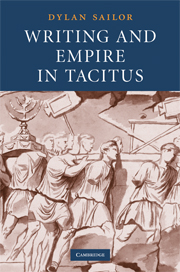Book contents
- Frontmatter
- Contents
- Acknowledgments
- List of abbreviations and editions used
- Introduction: a life, in fragments
- Chapter 1 Autonomy, authority, and representing the past under the Principate
- Chapter 2 Agricola and the crisis of representation
- Chapter 3 The burdens of Histories
- Chapter 4 “Elsewhere than Rome”
- Chapter 5 Tacitus and Cremutius
- Conclusion: on knowing Tacitus
- Works cited
- Index of passages discussed
- General index
Chapter 2 - Agricola and the crisis of representation
Published online by Cambridge University Press: 22 September 2009
- Frontmatter
- Contents
- Acknowledgments
- List of abbreviations and editions used
- Introduction: a life, in fragments
- Chapter 1 Autonomy, authority, and representing the past under the Principate
- Chapter 2 Agricola and the crisis of representation
- Chapter 3 The burdens of Histories
- Chapter 4 “Elsewhere than Rome”
- Chapter 5 Tacitus and Cremutius
- Conclusion: on knowing Tacitus
- Works cited
- Index of passages discussed
- General index
Summary
On March 27, 19 bce L. Cornelius Balbus proceeded through Rome in triumph, along a route packed with admiring denizens of the city, to the Temple of Jupiter Optimus Maximus, perched on the Capitoline Hill. His experience was no doubt gratifying, but the event was not, all things considered, so unusual: victorious generals had for centuries done the same thing, and his victory over the Garamantes was of no special moment by comparison. It is for an entirely different reason that his triumph attracts the notice of scholars: it was the last celebrated by a man outside the family of the sitting princeps. From the beginning, the Principate severely restricted opportunities for elite self-display, especially for public celebration of feats of conquest; removal of the possibility of a triumph is only the most familiar of the innovations that arrogated to the house of the princeps a monopoly on glory, and military glory in particular.
As a practical matter, principes needed preeminence: if another man had achieved greater renown, especially in an endeavor in which the princeps was supposed to excel, he inevitably came to seem a potential replacement for him. So Seneca, so Thrasea, so Helvidius, and so Agricola. The consequences of this need for a monopoly on glory are familiar.
- Type
- Chapter
- Information
- Writing and Empire in Tacitus , pp. 51 - 118Publisher: Cambridge University PressPrint publication year: 2008
- 1
- Cited by



